| Srl | Item |
| 1 |
ID:
081547
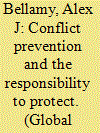

|
|
|
|
|
| Publication |
2008.
|
| Summary/Abstract |
Although the International Commission on Intervention and State Sovereignty identified the responsibility to prevent as the single most important aspect of its report The Responsibility to Protect, most scholarly and political attention has been given to the concept's reaction component rather than to its prevention component. This article aims to correct this imbalance by examining progress with, changes to, and attitudes toward the responsibility to prevent since the publication of the commission's report in 2001. It seeks to explain the relative neglect of prevention in debates about The Responsibility to Protect, arguing that the answer can be found in a combination of doubts about how wide the definition of prevention should be, political concerns raised by the use of prevention in the war on terrorism, and practical concerns about the appropriate institutional locus for responsibility. The article moves on to identify some basic principles that might help advance the responsibility to prevent
|
|
|
|
|
|
|
|
|
|
|
|
|
|
|
|
| 2 |
ID:
081552
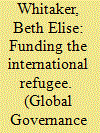

|
|
|
|
|
| Publication |
2008.
|
| Summary/Abstract |
Despite the abundance of literature on international regimes, little attention has been given to how they are funded and the impact of funding on regime performance. This article examines how donor funding has affected the underlying principle of protection in the international refugee regime. It focuses on the case of Tanzania, where refugee protection standards have declined consistently over the past twelve years, and argues that a shortage of funding within the regime has contributed to the shift in government policy in several ways. To the extent that funding cuts have had an influence on declining protection standards, this case suggests that resource shortages may cause practice within an international regime to become inconsistent with its underlying principles, thus weakening the overall regime
|
|
|
|
|
|
|
|
|
|
|
|
|
|
|
|
| 3 |
ID:
081549
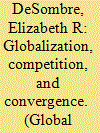

|
|
|
|
|
| Publication |
2008.
|
| Summary/Abstract |
This article examines the impact of globalization on international environmental, safety, and labor standards through the lens of impact of open registration in shipping-the ability of shipowners to choose in which states to register their ships. Shipowners have moved registration of ships to low-standard states, while traditional national registries relaxed standards in an effort to keep ship registrations. But recent successes in increasing standards have come from mechanisms of exclusion: ships that remain outside the international regulatory process are prevented from benefiting from their free riding by the imposition of trade restrictions, dockworker boycotts, and inspection and detention processes that single out those operating outside the international regulatory framework
|
|
|
|
|
|
|
|
|
|
|
|
|
|
|
|
| 4 |
ID:
081551
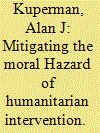

|
|
|
|
|
| Publication |
2008.
|
| Summary/Abstract |
The emerging norm of humanitarian intervention, or the Responsibility to Protect, resembles a social insurance policy to protect ethnic groups against genocide and ethnic cleansing. If a state perpetrates such genocidal violence, the norm calls for a payout-up to and including military intervention-to protect the group and ensure its security, often by enhancing its autonomy from the state. Unfortunately, this leads to a common pathology of insurance-moral hazard-whereby the expected payout for a loss unintentionally encourages excessively risky or fraudulent behavior. Thus, some militants may rebel despite the risk of provoking state retaliation, because they expect any resulting atrocities to attract intervention that facilitates their rebellion. This article summarizes recently published evidence for this dynamic, explores the feasibility of adapting insurance strategies that mitigate moral hazard, and then proposes a reform of humanitarian intervention based on the most feasible of these adapted strategies.
|
|
|
|
|
|
|
|
|
|
|
|
|
|
|
|
| 5 |
ID:
081550
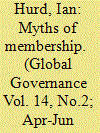

|
|
|
|
|
| Publication |
2008.
|
| Summary/Abstract |
The need to expand the UN Security Council is usually justified as necessary to update Council membership in light of changes in world politics. The mismatch between the existing membership and the increasingly diverse population of states is said to delegitimatize the Council. This rests on an implicit hypothesis about the source of institutional legitimacy. This article surveys reform proposals and finds five distinct claims about the connection between membership and legitimacy, each of which is either logically inconsistent or empirically implausible. If formal membership is indeed the key to institutional legitimacy, the causal link remains at best indeterminate, and we may have to look elsewhere for a theory of legitimation. We must also look for explanations for why the language of legitimation is so prevalent in the rhetoric of Council reform.
|
|
|
|
|
|
|
|
|
|
|
|
|
|
|
|
| 6 |
ID:
081548
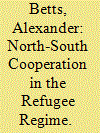

|
|
|
|
|
| Publication |
2008.
|
| Summary/Abstract |
This article explores the role of issue linkage in North-South relations in the global refugee regime between 1980 and 2005. It argues that North-South cooperation has been crucial for overcoming collective action failure in the regime. However, it suggests that because of the absence of a binding normative framework or overriding interest impelling Northern states to support refugee protection in the South, the prospects for overcoming North-South impasse have depended upon the ability of states and the Office of the United Nations High Commissioner for Refugees (UNHCR) to use issue linkage to connect the "refugee issue" to states' wider interests in other issue areas of global governance-notably migration, security, development, and peacebuilding. The article makes this argument by examining the four principal case studies of UNHCR-led attempts to facilitate North-South cooperation in order to address mass influx or protracted refugee situations in specific regional contexts: the International Conferences on Assistance to Refugees in Africa of 1981 and 1984; the International Conference on Central American Refugees of 1987-1994; the Comprehensive Plan of Action for Indochinese Refugees of 1988-1996; and the Convention Plus initiative of 2003-2005.
|
|
|
|
|
|
|
|
|
|
|
|
|
|
|
|
| 7 |
ID:
081545


|
|
|
| 8 |
ID:
081546


|
|
|